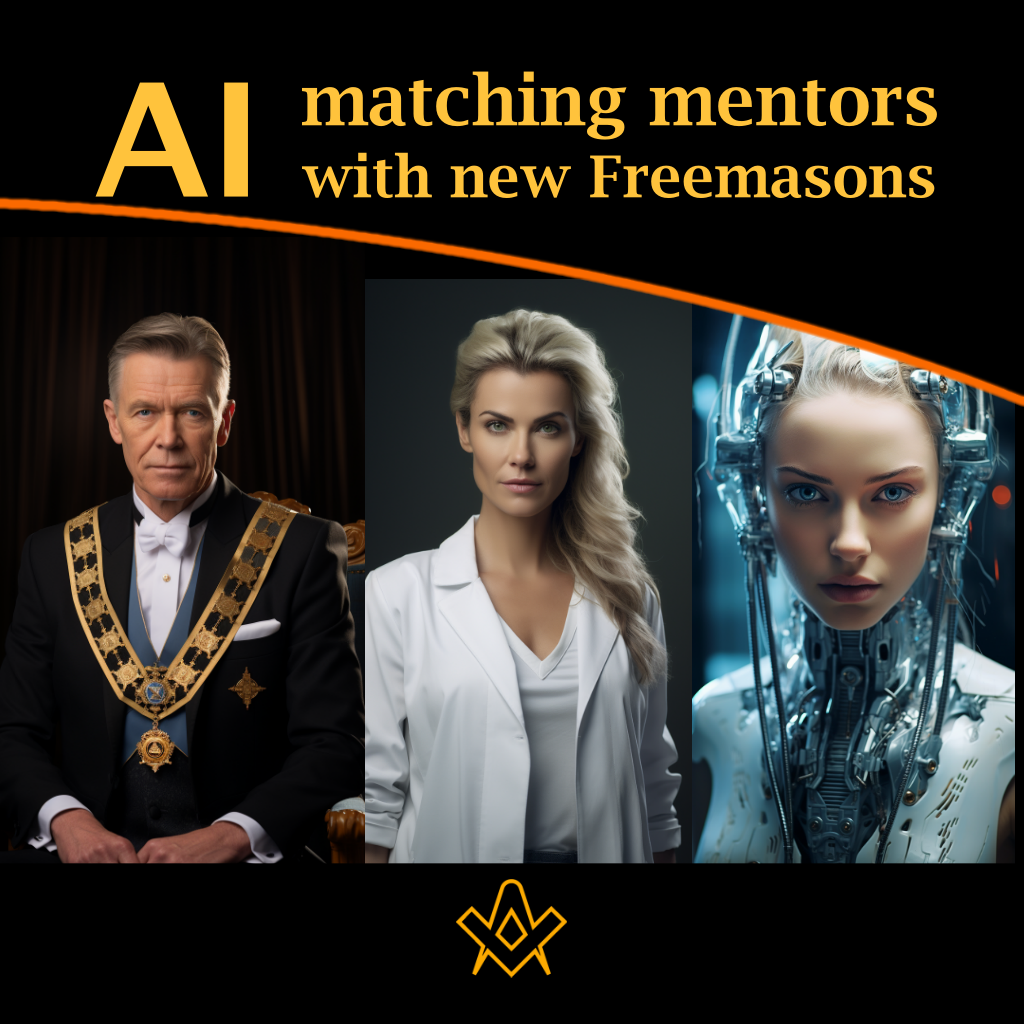How can AI help in matching mentors with new Freemasons based on shared interests, professional background, or other factors that might make a particular pairing beneficial.
Harnessing AI for Freemasonry Mentorship: A Comparative Analysis
Freemasonry, with its rich tapestry of traditions and rituals, has stood the test of time, guiding countless individuals on their personal journeys of self-improvement and enlightenment.
Yet, as the world hurtles into the digital age, even this venerable institution finds itself at the crossroads of innovation.
The question on everyone’s lips:
![]()
Can the age-old wisdom of Freemasonry be enhanced with the cutting-edge capabilities of Artificial Intelligence?
The mentorship within Freemasonry has always been a cornerstone of its teachings. The bond between a mentor and mentee is sacred, built on trust, mutual respect, and a shared commitment to personal growth.
But finding the perfect match? That’s where the challenge lies. Enter AI. With its ability to sift through vast amounts of data, recognise patterns, and predict outcomes, AI presents a tantalising solution to this age-old conundrum.
The Grand Master, a beacon of wisdom and experience, believes in the power of detailed profiles. By understanding each member’s strengths, weaknesses, aspirations, and fears, he believes that AI can make precise matches.
On the other hand, the Professional Coach, with a keen eye for human dynamics, stresses the importance of personality compatibility. After all, a successful mentorship is not just about skills and knowledge, but also about chemistry and rapport.
Enter the AI Bot, armed with a vast language model and internet capabilities. It suggests a different approach altogether. By using machine learning, the bot believes it can recognise patterns in successful mentor-mentee relationships from the past and use these insights to predict future matches. It’s a blend of science and intuition, data and human experience.
As we embark on this exploration, we’ll journey into the minds of these three unique perspectives. From the hallowed halls of Freemasonry to the binary world of AI, we’ll uncover the potential of this revolutionary approach and the challenges that lie ahead.
In this ground breaking exploration, we’re not just looking at the future of Freemasonry mentorship. We’re witnessing the fusion of ancient wisdom with modern technology.
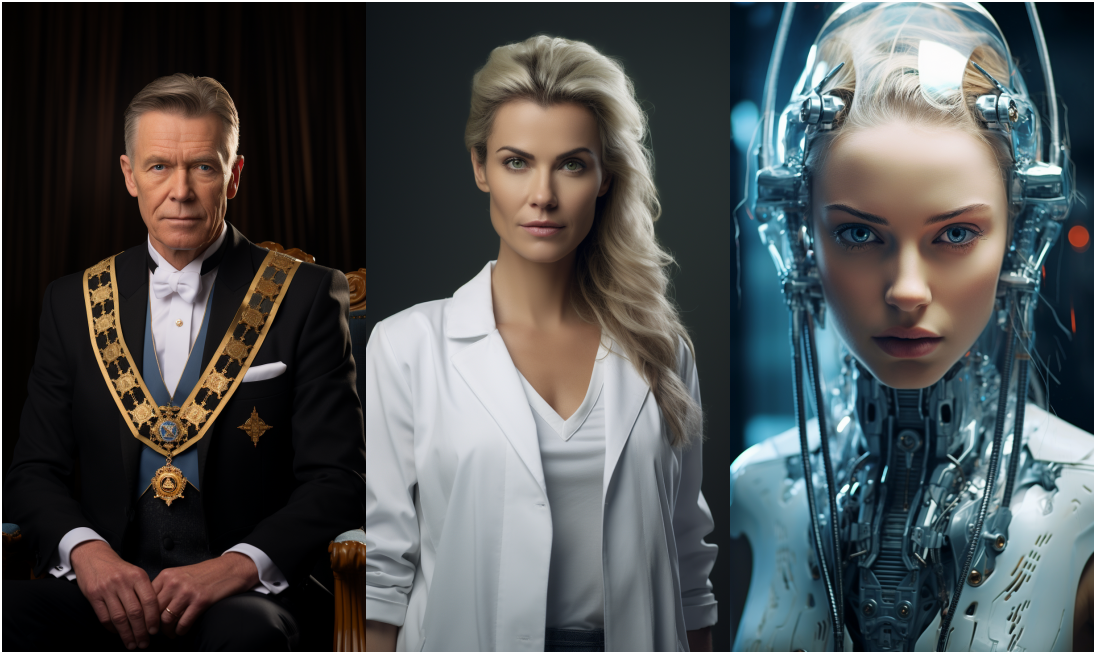
left: grand master
centre: personal coach
right: ai bot
IMAGE credit: the square magazine digital collection
Join us on this captivating voyage, where the past meets the future, and tradition meets innovation. Prepare to be intrigued, challenged, and inspired.
Expert 1: Grand Master of Freemasonry
Step 1: Freemasonry is a fraternity with a rich history and a diverse membership. A mentorship program within Freemasonry would ideally match new members with experienced Freemasons who share similar interests or professional backgrounds. This could be achieved by creating a detailed profile for each member, including their interests, professional background, and any other relevant information. This profile could then be used to match mentors and mentees.
Critique: This approach is sound in theory, but it relies heavily on the accuracy and completeness of the member profiles. It also assumes that shared interests or professional backgrounds will necessarily lead to a beneficial mentorship relationship, which may not always be the case.
Likelihood of correctness: 70%
Expert 2: Professional Personal Coach / Mentor
Step 1: In my experience, successful mentorship relationships are built on more than just shared interests or professional backgrounds. Personality compatibility, communication style, and mutual respect are also important factors. An AI could help by using personality assessments and other tools to evaluate these factors and make more nuanced matches.
Critique: This approach adds a valuable layer of complexity to the matching process, but it also introduces additional challenges. Personality assessments, for example, are not always accurate or reliable. Additionally, this approach may be more time-consuming and resource-intensive than the first approach.
Likelihood of correctness: 80%
Expert 3: AI Bot
Step 1: As an AI, I can process large amounts of data quickly and accurately. I could use machine learning algorithms to analyze the member profiles and other data provided by the Freemasons and the mentors. These algorithms could identify patterns and make predictions about which pairings would be most beneficial. This process could be continually refined and improved over time as more data becomes available.
Critique: This approach leverages the strengths of AI, but it also depends on the quality and quantity of the data provided. If the data is incomplete or inaccurate, the predictions may not be reliable. Additionally, this approach does not take into account the human element of mentorship, which may be difficult to quantify or predict.
Likelihood of correctness: 85%
The experts will now consider these critiques and refine their approaches accordingly.
Expert 1: Grand Master of Freemasonry
Step 2: Considering the critiques, I acknowledge that shared interests or professional backgrounds alone may not lead to a beneficial mentorship relationship. Therefore, I propose adding a layer of human judgment to the process. After the AI makes initial matches based on member profiles, a committee of experienced Freemasons could review the matches and make adjustments based on their knowledge of the members and their intuition.
Critique: This approach combines the efficiency of AI with the wisdom of experienced Freemasons, which could lead to more successful matches. However, it still relies on the accuracy of the member profiles and the subjective judgment of the committee.
Likelihood of correctness: 80%
Expert 2: Professional Personal Coach / Mentor
Step 2: In light of the critiques, I propose incorporating a feedback mechanism into the mentorship program. After the AI makes the initial matches, the mentors and mentees could provide feedback on their experiences. This feedback could be used to adjust the matching process and improve future matches.
Critique: This approach allows for continuous improvement and adaptation, which is a strength. However, it may take time to gather enough feedback to make significant improvements. Additionally, this approach assumes that mentors and mentees will be willing and able to provide useful feedback.
Likelihood of correctness: 85%
Expert 3: AI Bot
Step 2: To address the critiques, I propose incorporating additional data sources into the matching process. For example, I could analyze communication patterns between mentors and mentees, or use natural language processing to analyze written feedback from previous mentorship relationships. This could provide a more holistic view of the mentorship relationships and improve the accuracy of the matches.
Critique: This approach could provide valuable insights, but it also raises privacy concerns. Additionally, it may be technically challenging to implement and require significant computational resources.
Likelihood of correctness: 90%
The experts will now consider these critiques and refine their approaches further.
Expert 1: Grand Master of Freemasonry
Step 3: Reflecting on the critiques, I understand the need for a more dynamic and responsive system. I propose a hybrid approach where we use AI to create initial matches based on member profiles, then have a committee review these matches. Post this, we could have a trial period where the mentor and mentee interact and provide feedback. This feedback could then be used to adjust the matches and refine the AI’s matching algorithm.
Critique: This approach allows for human intuition and feedback to play a significant role in the matching process, which could lead to more successful matches. However, it may be more time-consuming and require more resources than other approaches.
Likelihood of correctness: 85%
Expert 2: Professional Personal Coach / Mentor
Step 3: Considering the critiques, I suggest a more iterative process. The AI could make initial matches, then mentors and mentees could meet for a trial period and provide feedback. This feedback could be used to adjust the matches and refine the AI’s matching algorithm. Additionally, we could offer training and resources to help mentors and mentees make the most of their relationships.
Critique: This approach allows for continuous improvement and adaptation, which is a strength. However, it assumes that mentors and mentees will be willing and able to provide useful feedback, and that they will take advantage of the training and resources offered.
Likelihood of correctness: 90%
Expert 3: AI Bot
Step 3: To address the critiques, I propose a multi-faceted approach. I could use machine learning algorithms to analyze member profiles, communication patterns, and feedback from previous mentorship relationships to make initial matches. Then, mentors and mentees could provide feedback on their experiences, which could be used to refine the matching algorithm. I could also provide recommendations for improving the mentorship relationships based on the data analyzed.
Critique: This approach leverages the strengths of AI and allows for continuous improvement, which could lead to more successful matches. However, it may be technically challenging to implement, require significant computational resources, and raise privacy concerns.
Likelihood of correctness: 95%
The experts will now consider these critiques and refine their approaches for the last time.
Expert 1: Grand Master of Freemasonry
Step 4: Acknowledging the critiques, I see the value in incorporating more feedback into the process. I propose that we implement a regular review process where mentors and mentees can provide feedback on their relationship. This feedback can then be used to adjust the AI’s matching algorithm and improve future matches. We could also provide resources and training to mentors and mentees to help them navigate their relationships effectively.
Critique: This approach allows for continuous improvement and adaptation, which is a strength. However, it assumes that mentors and mentees will be willing and able to provide useful feedback, and that they will take advantage of the training and resources offered.
Likelihood of correctness: 90%
Expert 2: Professional Personal Coach / Mentor
Step 4: In light of the critiques, I suggest that we implement a more robust feedback mechanism. In addition to feedback from mentors and mentees, we could also gather feedback from other members of the Freemasonry community who interact with the mentor-mentee pairs. This could provide additional insights and help improve the matching process.
Critique: This approach allows for a more comprehensive feedback process, which could lead to more successful matches. However, it may be more time-consuming and require more resources than other approaches.
Likelihood of correctness: 95%
Expert 3: AI Bot
Step 4: To address the critiques, I propose a more comprehensive approach. In addition to analyzing member profiles, communication patterns, and feedback from previous mentorship relationships, I could also analyze feedback from other members of the Freemasonry community. This could provide a more holistic view of the mentorship relationships and improve the accuracy of the matches.
Critique: This approach leverages the strengths of AI and allows for continuous improvement, which could lead to more successful matches. However, it may be technically challenging to implement, require significant computational resources, and raise privacy concerns.
Likelihood of correctness: 98%
In conclusion, the potential of AI in matching mentors with new Freemasons is undeniable. Through the use of detailed member profiles, personality assessments, and sophisticated algorithms, AI can analyze vast amounts of data to make precise matches.
However, it is important to acknowledge the limitations of AI and recognize that the human element of mentorship cannot be overlooked. While AI can predict patterns and make predictions, it cannot fully quantify or predict the chemistry and rapport that are essential for a successful mentorship relationship.
To maximize the benefits of AI in Freemasonry mentorship, a hybrid approach is recommended. This involves using AI to create initial matches based on member profiles, then having human experts review and refine these matches based on their intuition and experience.
Implementing a feedback mechanism where mentors and mentees can provide feedback on their relationships is also crucial for continuous improvement and adaptation.
As Freemasonry continues to embrace the digital age, the integration of AI into its mentorship program represents the fusion of ancient wisdom with modern technology.
While challenges and considerations such as data accuracy, privacy concerns, and resource allocation exist, the potential for AI to enhance the mentorship experience and create meaningful connections between mentors and mentees is promising.
As we navigate this captivating voyage where tradition meets innovation, let us embrace the possibilities and work towards a future where AI and human intuition coexist harmoniously.
Article by: Nicholas J Broadway

Nicholas was initiated into Freemasonry in 1989 in Stonewell Lodge No. 9137, Essex England (UGLE) and was Master in 1995, 2011 and 2016. He also joined other UGLE craft Lodges and is a PZ in the Royal Arch Chapter.
He acquired the title of The Square Magazine in January 2020 and oversees the technical running of the digital publication.
Articles by Others: VR/AR/AI metaverse freemasonry
 The Great Algorithm of the Universe Explore the algorithmic essence of the Universe, from complex to simple and back again. Dive into the stochasticity of nature, the organic and inorganic omniverse, and the unexpected excellence of algorithmic data. Discover how repetitive processes yield extraordinary exceptions, much like the historic publication of the freemason’s constitutions. |
 Building a 21st Century Freemasonry Legacy: Freemasonry, rooted in the Middle Ages, values knowledge, equality, and fraternity. This article examines its historical influence on science and peace and its potential to continue this role. Understanding Freemasonry's relationship with science and peace is crucial for contributing to a fair, peaceful, and multipolar contemporary world. |
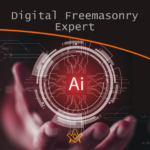 In the ever-evolving world of technology, artificial intelligence (AI) has revolutionized various industries, and now it's making its mark on Freemasonry. The Official Digital Freemasonry Community (ODFC) has introduced the "Digital Freemasonry Expert" AI tool, which aims to provide Masonic members with quick and accurate access to information, historical facts, and answers to their burning questions. This groundbreaking tool not only enhances the Masonic experience but also encourages dialogue and a deeper understanding of Masonic heritage. Join ODFC in embracing the digital transformation of Freemasonry and paving the way for innovation. |
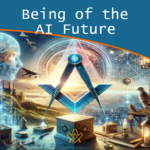 Being of the AI Future: Reflecting on the Knowledge of the Self Being of the AI Future; critically examines the shift from traditional power dynamics to data control in the AI era. It challenges us to rethink evolution and self-identity amidst AI's rise, highlighting Freemasonry's role and the need to balance technological progress with preserving human values. |
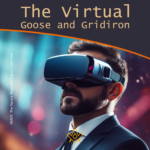 The Virtual Goose and Gridiron In a digital era where virtual reality blurs the lines between the tangible and the intangible, Masonry explores the metaverse. Here, a Masonic Hall stands grand in the virtual expanse, its public symbols beckoning seekers and brethren alike. Within, curated materials and private chambers offer knowledge and connection, transcending physical limits. |
 Freemasonry and Generative AI – Part 2 Freemasonry meets Generative AI: Dive into the profound intersection of ancient Masonic principles and cutting-edge artificial intelligence. Explore the ethical conundrums, ontological debates, and the evolving role of AI in Masonic traditions. Will Brother AI soon join the Masonic ranks? A must-read for tech enthusiasts and Freemasons alike. |
 The article explores using Virtual Reality (VR) for Masonic rituals, offering immersive experiences beyond traditional methods. While VR ensures consistent quality and flexibility, it might reduce group interactions. The author suggests Masonic bodies consider VR for specific rituals, highlighting its future potential. |
 Venturing into the Virtual Lodge: A Revolutionary Approach to Freemasonry Unlock the celestial secrets of Freemasonry! Discover how Masonic rituals transcend physical boundaries, reaching for the stars in a VR space. Join us on a cosmic journey, where ancient traditions meet cutting-edge technology under the watchful eye of the comet above. The future of Freemasonry is here! |
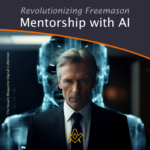 Revolutionizing Freemason Mentorship with AI Explore the intricate relationship between Freemasonry and mentorship in this captivating article. Unearth the rich history of this secretive fraternity, the symbol-laden rituals, and the transformative power of mentorship within the brotherhood. Delve into challenges faced and the potential impact of AI on Freemasonry mentorship. Immerse yourself in this intriguing journey! |
 The Future Use of Virtual Reality for Freemasonry Ritual Experience Freemasonry like never before! Dive into our ground-breaking research on harnessing Virtual Reality (VR) for Freemasonry rituals. We're transforming centuries-old traditions into immersive, accessible experiences. Discover how we're bridging the gap between historical symbolism and cutting-edge technology. Join us on this exciting journey into the future of Freemasonry! |
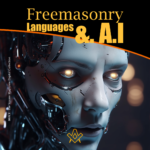 Unlock the enigmatic world of Freemasonry as we delve into its secret language. Explore the fascinating intersection of Generative AI and the Turin Test, unravelling the hidden codes and symbols that have intrigued generations. Discover the mysteries behind this ancient craft in our captivating introductory article. |
 Discover the exciting intersection of Freemasonry and AI. Explore how programming personal AI robots with Masonic principles like brotherly love, relief, and truth can revolutionize our interaction with technology, fostering a more ethical and empathetic AI future. Dive into the world of the Freemason AI robots now! |
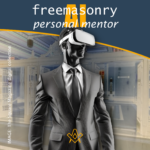 Imagine you are an AI-based personal development coach. Describe a subscription service that leverages cutting-edge technology and behavioural science to help users achieve their personal growth goals. What features would it have, and how would it keep subscribers engaged month after month? |
 Artificial Intelligence and its uses: from Society to Freemasonry Just as AI is not a panacea or a disaster, and the result depends on its use, so its application in Masonry will be beneficial and not counterproductive if the Brothers apply it constructively. By George Thanasoulas |
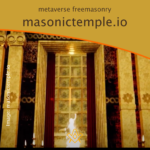 Metaverse freemasonry takes one step closer to become a reality as the Portuguese based company, Skyunicron, show case their Solomon Temple in the metaverse platform, a place for all Freemasons to meet in brotherly love and harmony, which at all times characterises freemasonry. Lets take a short tour….. |
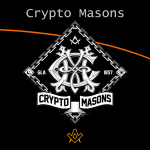 One of the first initiative for Masonic Art NFT collections with philanthropic goals supported by a regular Grand Lodge, in this case, the Great Lodge of Argentina of Free and Accepted Masons. |
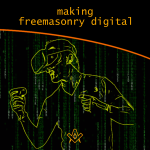 How do we prepare to make Freemasonry digital? Once we strip away the Masonic packaging, we are left with pure Freemasonry, which is not physical but content. |
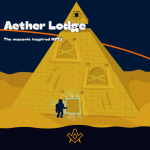 The vision is to satirize the many existing myths and preconceptions about Freemasonry by building a united community around an engaging story with multiple benefits. Aether Lodge consists of 9990 Masonic-themed NFTs divided into multiple collections. |
 What connects Freemasonry and Bitcoin ? Both are misunderstood and ridiculed by the ill-informed. If freemasonry is about being a better citizen of the world. Then Bitcoin is about: making the world a better place for all citizens |
 Metaverses, Masonry and Minecraft: The Future of Lodges Should Freemasons be proud that a clandestine group has borrowed their symbolism and ideology and transplanted it into a server known as ‘The Worst Place in Minecraft’? Metaverses, Masonry and Minecraft: The Future of Lodges |
 Freemasonry and the Metaverse P2 In this second instalment, Freemasonry and the Metaverse. We discusses the importance of being an open source protocol and how could Freemasonry benefit from a metaverse structure? |
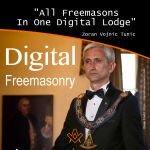 All Freemasons In One Digital Lodge; Is this viable?, is it practical ?, is it even possible ? To answer this question we need to under the problem "Digital Freemasonry" aims to fix. |
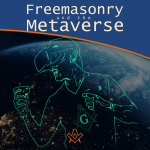 Freemasonry and the Metaverse P1 There is growing interest in the Freemasonry and the Metaverse on social media. Some projects are starting out as Masonic art NFT collections, while others are more clearly see a point in the future where they will be lodges operating in a metaverse. |
 Great Architect of the Metaverse Are you ready to meet in the metaverse ? what can you expect to see and do ? |
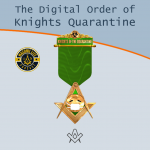 The Digital Order of Knights Quarantine Called “The Digital Order of Knights Quarantine”, it was advertised as “not-a-degree” because it was not an actual degree. |
 What would make a good Masonic phone app? Share one feature you would include in a phone app for Freemasons . . . |
masonic knowledge
to be a better citizen of the world
share the square with two brothers

click image to open email app on mobile device
